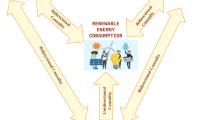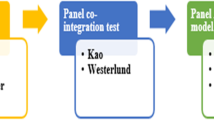Abstract
This study aims to examine the three-way linkages between renewable energy consumption, carbon dioxide emissions, and human development index for a set of 14 Mediterranean countries over the period spanning from 1990 to 2016. We used the simultaneous equations approach to estimate these linkages. This system of equations is estimated by the three-stage least squares (3SLS) and seemingly unrelated regression (SUR) methods. These techniques allow it possible to assess all the parameters of the models at the same time and to solve the endogeneity issue. We have shown that renewable energy makes a substantial contribution to improving economic conditions and sustainable development levels. Our results confirmed that renewable energy consumption generates a negative effect on CO2 emissions, thus confirming the idea that employing new sources of cleaner energy is the best way to tackle this issue. We also found that the nonlinear relationship between pollution level and economic development, defined by the inverted U-shaped quadratic form, is confirmed in SUR estimation, but it is not validated in 3SLS estimation. In this context, some countries such as the Mediterranean countries are taking the initiative to restructure their energy consumption profile by investing heavily in the renewable energy industry. Therefore, the transition from the fossil fuels use to renewable energy is not a choice, but an urgent issue to achieve climate stability and, in turn, the goals of sustainable development.
Similar content being viewed by others
Ddata availability of material (data transparency)
Not applicable.
Code availability (software application or custom code)
Not applicable.
References
Abolhosseini S, Heshmati A (2014) The main support mechanisms to finance renewable energy development. Renew Sustain Energy Rev 40:876–885
Akar BG (2016) The determinants of renewable energy consumption: An empirical analysis for the Balkans. Eur J Sci Res 12(11)
Alola AA (2019) Carbon emissions and the trilemma of trade policy, migration policy and health care in the US. Carbon Manag 10(2):209–218
Amer H (2020) The impact of renewable energy consumption on the human development index in selected countries: panel analysis (1990–2015). Int J Econ Energy Environ 5(4):47
Arampatzidis I, Dergiades T, Kaufmann RK, Panagiotidis T (2021) Oil and the U.S. stock market: implications for low carbon policies. Energy Econ 103:105588
Arellano M, Bover O (1995) Another look at the instrumental variable estimation of error-components models. J Econom 68(1):29–51
Bastola U, Sapkota P (2015) Relationships among energy consumption, pollution emission, and economic growth in Nepal. Energy 80:254–262
Boos A (2015) Genuine savings as an indicator for “weak” sustainability: critical survey and possible ways forward in practical measuring. Sustainability 7(4):4146–4182
Breitung J (2001) The local power of some unit root tests for panel data. In: Baltagi BH, Fomby TB, Hill RC (eds) Non stationary panels, panel cointegration, and dynamic panels (vol 15, pp 161–77). Emerald Group Publishing Limitedm, Bingley
Bulut U (2017) The impacts of non-renewable and renewable energy on CO2 emissions in Turkey. Environ Sci Pollut Res 24(18):15416–15426
Chen W, Zheng R, Zhang S, Zeng H, Zuo T, Xia HJ (2017) Cancer incidence and mortality in China in 2013: an analysis based on urbanization level. Chin J Cancer Res 29(1):1
Damette O, Marques AC (2019) Renewable energy drivers: a panel cointegration approach. App Econ 51(26):2793–2806
Dincer I (2000) Renewable energy and sustainable development: a crucial review. Renew Sustain Energy Rev 4(2):157–175
Granovskii M, Dincer I, Rosen MA (2007) Exergetic life cycle assessment of hydrogen production from renewables. J Power Sources 167(2):461–471
Güney T (2019) Renewable energy, non-renewable energy and sustainable development. Int J Sustain Dev World Ecol 26(5):389–397
IRENA (2014) Renewable power generation costs in 2014. International Renewable Energy Agency.
Im KS, Pesaran MH, Shiny Y (2003) Testing for unit roots in heterogeneous panels. J Economs 115(1):53–74
Jebli MB, Youssef SB (2017) The role of renewable energy and agriculture in reducing CO2 emissions: evidence for North Africa countries. Ecol Indic 74:295–301
Kalogirou SA (2004) Solar thermal collectors and applications. Prog Energy Combust Sci 30(3):231–295
Kazar G, Kazar A (2014) The renewable energy production-economic development nexus. Int J Energy Econ Policy 4(2):312
Koirala BS, Pradhan G (2020) Determinants of sustainable development: evidence from 12 Asian countries. Sustain Dev 28(1):39–45
Kremer M (1993) The O-ring theory of economic development. Q J Econ 108(3):551–575
Kuznets S (1955) Economic growth and income inequality. Am Econ Rev 45(1):1–28
Kuznets S (1976) Demographic aspects of the size distribution of income: an exploratory essay. Econ Dev Cult Change 25(1):1–94
Levin A, Lin CF, Chu CSJ (2002) Unit root tests in panel data: asymptotic and finite-sample properties. J Economs 108(1):1–24
Maddala GS, Shaowen W (1999) A comparative study of unit root tests with panel data and a new simple test. Oxf Bull Econ Stat 61:631–652
Marques AC, Fuinhas JA, Manso JP (2010) Motivations driving renewable energy in European countries: a panel data approach. Energy Policy 38(11):6877–6885
Martinez DM, Ebenhack BW (2008) Understanding the role of energy consumption in human development through the use of saturation phenomena. Energy Policy 36(4):1430–1435
McCollum DL, Zhou W, Bertram C, De Boer HS, Bosetti V, Busch S, Riahi K (2018) Energy investment needs for fulfilling the Paris Agreement and achieving the Sustainable Development Goals. Nat Energy 3(7):589–599
Moon HR, Perron B, Phillips PCB (2006) On the Breitung test for panel unit roots and local asymptotic power. Econ Theory 22:1179–1190
Murshed M (2020) An empirical analysis of the non-linear impacts of ICT-trade openness on renewable energy transition, energy efficiency, clean cooking fuel access and environmental sustainability in South Asia. Environ Sci Pollut Res 27(29):36254–36281
Nerini FF, Tomei J, To LS, Bisaga I, Parikh P, Black M, Mulugetta Y (2018) Mapping synergies and trade-offs between energy and the Sustainable Development Goals. Nat Energy 3(1):10–15
Omri A, Nguyen DK (2014) On the determinants of renewable energy consumption: international evidence. Energy 72:554–560
Ouedraogo NS (2013) Energy consumption and human development: evidence from a panel cointegration and error correction model. Energy 63:28–41
Pesaran M (2007) A simple panel unit root test in the presence of cross-section dependence. J Appl Econ 22:265–312
Pirlogea C, Cicea C (2012) Econometric perspective of the energy consumption and economic growth relation in European Union. Renew Sustain Energy Rev 16(8):5718–5726
Poumanyvong P, Kaneko S (2010) Does urbanization lead to less energy use and lower CO2 emissions? A Cross-Country Analysis. Ecol Econ 70(2):434–444
Rafiq S, Bloch H, Salim R (2014) Determinants of renewable energy adoption in China and India: a comparative analysis. App Econ 46(22):2700–2710
Romano AA, Scandurra G, Carfora A, Fodor M (2017) Renewable investments: the impact of green policies in developing and developed countries. Renew Sustain Energy Rev 68:738–747
Rüstemoğlu H, Andrés AR (2016) Determinants of CO2 emissions in Brazil and Russia between 1992 and 2011: a decomposition analysis. Environ Sci Policy 58:95–106
Sadorsky P (2009) Renewable energy consumption and income in emerging economies. Energy Policy 37(10):4021–4028
Salim RA, Rafiq S (2012) Why do some emerging economies proactively accelerate the adoption of renewable energy? Energy Econ 34(4):1051–1057
Salim RA, Rafiq S, Shafiei S (2017) Urbanization, energy consumption, and pollutant emission in Asian developing economies: an empirical analysis, ADBI Working Paper no 718
Sapkota A, Lu Z, Yang H, Wang J (2014) Role of renewable energy technologies in rural communities’ adaptation to climate change in Nepal. Renew Energ 68:793–800
Sasmaz MU, Sakar E, Yayla YE, Akkucuk U (2020) The relationship between renewable energy and human development in OECD countries: a panel data analysis. Sustainability 12(18):7450
Sebri M, Ben-Salha O (2014) On the causal dynamics between economic growth, renewable energy consumption, CO2 emissions and trade openness: fresh evidence from BRICS countries. Renew Sustain Energy Rev 39:14–23
Sen A (1988) Freedom of choice: concept and content. Eur Econ Rev 32(2–3):269–294
Shafiei S, Salim RA (2014) Non-renewable and renewable energy consumption and CO2 emissions in OECD countries: a comparative analysis. Energy Policy 66:547–556
Da Silva PP, Cerqueira PA, Ogbe W (2018) Determinants of renewable energy growth in Sub-Saharan Africa: Evidence from panel ARDL. Energy 156:45–54
Soukiazis E, Proenca S, Cerqueira PA (2019) The interconnections between renewable energy, economic development and environmental pollution: a simultaneous equation system approach. Energy J 40(4)
Tiba S, Belaid F (2021) Modeling the nexus between sustainable development and renewable energy: the African perspectives. J Econ Surv 35(1):307–329
UNDP (2009) Human development report2009-overcoming barriers: human mobility and development : 30 septembre 2019. United Nations Development Programme, New Work
Wang B, Wang Q, Wei YM, Li ZP (2018) Role of renewable energy in China’s energy security and climate change mitigation: An index decomposition analysis. Renew Sustain Energy Rev 90:187–194
WDI (2017) World development indicators. World Bank, Washington D.C.
Wu J (2013) Landscape sustainability science: ecosystem services and human well-being in changing landscapes. Landsc Ecol 28(6):999–1023
Yang D, Ye C, Wang X, Lu D, Xu J, Yang H (2018) Global distribution and evolvement of urbanization and PM2. 5 (1998–2015). Atmospheric Environ 182:171–178
Yang J, Zhang W, Zhang Z (2016) Impacts of urbanization on renewable energy consumption in China. J Clean Prod 114:443–451
Yolanda Y (2017) Analysis of factors affecting inflation and its impact on human development index and poverty in Indonesia. Eur Res Stud J 20(4B):38–56
Yu X, Qu H (2013) The role of China’s renewable powers against climate change during the 12th Five-Year and until 2020. Renew Sustain Energy Rev 22:401–409
Zhang B, Wang B, Wang Z (2017) Role of renewable energy and non-renewable energy consumption on EKC: evidence from Pakistan. J Clean Prod 156:855–864
Zhao J, Jiang Q, Dong X, Dong K (2020) Would environmental regulation improve the greenhouse gas benefits of natural gas use? A Chinese Case Study. Energy Econ 87:104712
Zhou W, Zhu B, Chen D, Griffy-Brown C, Ma Y, Fei W (2012) Energy consumption patterns in the process of China’s urbanization. Popul Environ 33(2):202–220
Funding
Not applicable.
Author information
Authors and Affiliations
Contributions
Not applicable.
Corresponding author
Ethics declarations
Conflict of interest
The authors declare that they have no conflict of interest.
Ethical approval
Not applicable
Consent to participate
Nnot applicable.
Consent for publication
Not applicable.
Additional information
Publisher's Note
Springer Nature remains neutral with regard to jurisdictional claims in published maps and institutional affiliations.
Appendices
Appendix 1 Mediterranean Countries
Algeria | France | Lebanon |
|---|---|---|
Egypt | Italy | Turkey |
Morocco | Spain | Israel |
Tunisia | Greece | Jordan |
Portugal | Cyprus |
Appendix 2 Summary of definitions, measures, and sources of the variables
Variables | Definitions | measures | Sources |
|---|---|---|---|
HDI | Human development index | Index from 0 to 100 | Human Development Report (UNDP, 2009) |
REN | Combustible renewables and waste (% of total energy) | in metric ton of oil equivalent | WDI (2017) |
POP | Total Population | 1000 persons | WDI (2017) |
CO2 | Carbon dioxyde emissions | metric tons per capita | WDI (2017) |
INF | Inflation, GDP deflator | Annual % | WDI (2017) |
NREN | Final energy consumption per capita | Thousand tonnes of oil equivalent (TOE) | WDI (2017) |
URB | Urban Population | % of total population | WDI (2017) |
RENT | Total natural resources rents | % of GDP | WDI(2017) |
Rights and permissions
About this article
Cite this article
Dradra, Z., Abdennadher, C. Modeling the effects of renewable energy on sustainable development: evidence from simultaneous equations models. Econ Change Restruct 56, 2111–2128 (2023). https://doi.org/10.1007/s10644-022-09409-0
Received:
Accepted:
Published:
Issue Date:
DOI: https://doi.org/10.1007/s10644-022-09409-0




